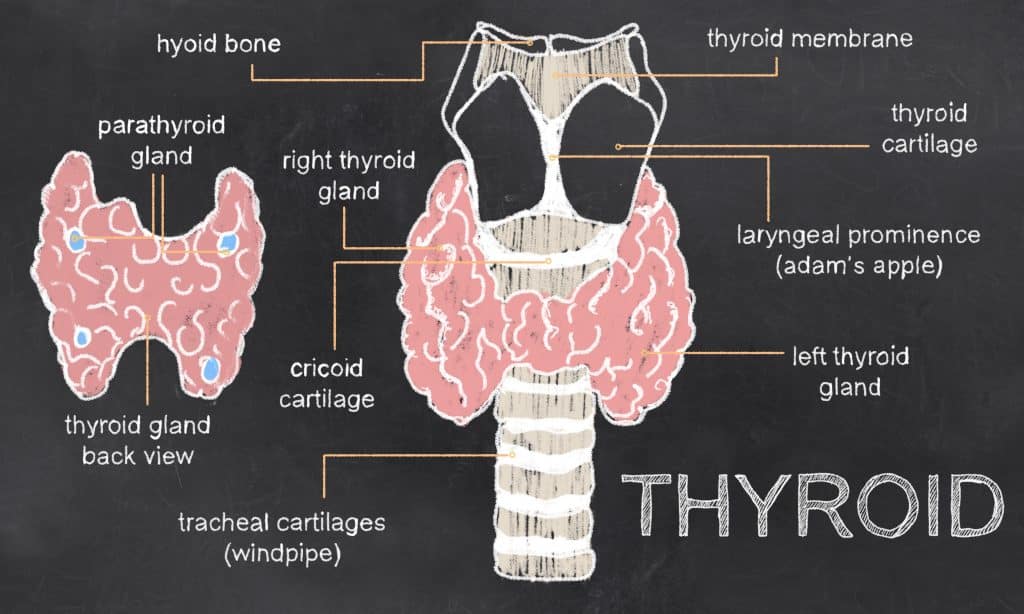Feeling constantly fatigued despite getting a full night’s sleep? Experiencing unexplained weight changes or mood swings? These could be signs of a thyroid issue. The thyroid gland plays a critical role in regulating metabolism, energy, and mood. Understanding its function and keeping it in optimal condition is crucial for overall well-being. This article serves as a comprehensive guide to help you test for thyroid issues at home, offering insights into symptoms, testing methods, and what to do with your results.
Contents
- 1 Understanding The Thyroid Gland
- 2 Why Regular Thyroid Testing Is Crucial
- 3 Recognizing Symptoms Of Thyroid Issues
- 4 Types Of Thyroid Tests
- 5 At-Home Thyroid Testing Kits
- 6 How To Use An At-Home Thyroid Test Kit
- 7 Interpreting Your Results
- 8 Other Ways To Monitor Thyroid Health At Home
- 9 Take Action For Your Thyroid Health
Understanding The Thyroid Gland

The thyroid gland is a small, butterfly-shaped organ located at the base of the neck. It produces hormones that regulate a variety of bodily functions, including metabolism, heart rate, and body temperature. Thyroid hormones, mainly thyroxine (T4) and triiodothyronine (T3) are essential for the proper functioning of almost every cell in the body. When the thyroid gland is not working as it should, it can lead to a range of health issues.
Common thyroid disorders include hypothyroidism, where the gland is underactive, and hyperthyroidism, where it is overactive. Hypothyroidism can lead to symptoms like fatigue, weight gain, and depression, while hyperthyroidism may result in weight loss, high levels of anxiety, and sleep disturbances. Knowing the function of the thyroid gland and the hormones it produces can help you better understand the symptoms you may be experiencing.
Why Regular Thyroid Testing Is Crucial

Untreated thyroid issues can lead to a host of complications, including cardiovascular diseases, osteoporosis, and, in extreme cases, coma or death. Early detection and treatment are vital for managing these risks effectively. Regular thyroid testing can help you catch any imbalances early on, making treatment more straightforward and less invasive.
Moreover, thyroid issues can have a domino effect on other aspects of your health. For instance, an underactive thyroid can lead to high cholesterol, increasing heart disease risk. On the other hand, an overactive thyroid can result in bone loss, elevating the risk of fractures. Therefore, keeping tabs on your thyroid health is not just about the gland itself but also about maintaining overall health and wellness.
Recognizing Symptoms Of Thyroid Issues

If you’re experiencing symptoms like persistent fatigue, changes in weight, or mood swings, it might be time to consider the health of your thyroid gland. These symptoms can often be vague and attributed to other conditions, making it challenging to diagnose thyroid issues based solely on how you feel. However, a combination of multiple symptoms can serve as a red flag, signaling the need for further investigation.
It’s crucial to consult a healthcare provider for an accurate diagnosis, especially if you’re experiencing multiple symptoms. Blood tests are the most common diagnostic tool for thyroid issues, but recognizing the symptoms early on can expedite the process of diagnosis and treatment. Being proactive about your health can make all the difference in effectively managing thyroid-related conditions.
Types Of Thyroid Tests

When it comes to diagnosing thyroid issues, several types of tests are commonly used. Blood tests are the most prevalent, measuring levels of Thyroid Stimulating Hormone (TSH), Free T4, and Free T3. These tests provide a comprehensive view of thyroid function and are usually the first step in diagnosis. Other tests include thyroid ultrasound and radioactive iodine uptake tests, which are typically conducted in a medical setting to provide a more detailed analysis.
While blood tests are the gold standard for thyroid diagnosis, they are not the only option. Imaging tests like ultrasounds can help identify nodules or irregularities in the thyroid gland. Radioactive iodine uptake tests can offer insights into how well the thyroid gland is functioning. However, these tests are generally more invasive and expensive than blood tests, making them less commonly used for initial diagnosis.
At-Home Thyroid Testing Kits

The convenience of at-home thyroid testing kits has made them increasingly popular. These kits typically include all the necessary tools to collect a blood or saliva sample, which you then send to a lab for analysis. The results are usually available online within a few days, providing a quick and convenient way to check your thyroid hormone levels. However, it’s essential to note that these kits may not be as comprehensive as the tests conducted in a medical setting.
While at-home thyroid testing kits offer the advantage of convenience, they also have limitations. The range of hormones tested may be narrower compared to traditional blood tests. Additionally, without the guidance of a healthcare provider, interpreting the results can be challenging. Therefore, while these kits serve as a useful preliminary screening tool, they should not replace a comprehensive evaluation by a healthcare provider.
How To Use An At-Home Thyroid Test Kit

Using an at-home thyroid test kit is generally straightforward. Most kits come with detailed instructions that guide you through the process of collecting a blood or saliva sample. It’s crucial to follow these instructions carefully to ensure the sample is uncontaminated and accurate. Once the sample is collected, it’s typically placed in a pre-labeled container and mailed to a lab for analysis.
Before using an at-home test kit, make sure to read all the instructions and precautions. Some tests may require fasting or avoiding certain medications before sample collection. After sending the sample, it’s essential to keep an eye on your results and consult a healthcare provider for interpretation and the next steps. Remember, while these tests provide valuable insights, they are not a substitute for professional medical advice.
Interpreting Your Results

Once you receive the results from your at-home thyroid test kit, you’ll likely see metrics for TSH, Free T3, and Free T4 levels. Elevated TSH levels could indicate an underactive thyroid, while low levels might suggest an overactive thyroid. Free T3 and Free T4 levels provide additional context, helping to paint a fuller picture of your thyroid health. However, these numbers are just one piece of the puzzle and should be interpreted in conjunction with other medical data.
Interpreting these results accurately is crucial for determining the best course of action. If the levels are outside the normal range, it’s strongly advised to consult a healthcare provider for a more comprehensive evaluation. They may recommend additional tests or imaging studies to confirm the diagnosis. Once a diagnosis is made, appropriate treatment options can be discussed to manage your symptoms effectively.
Other Ways To Monitor Thyroid Health At Home

Beyond formal testing, there are other ways to keep an eye on your thyroid health at home. A balanced diet rich in essential nutrients like iodine and selenium can support thyroid function. Exercise also plays a role; regular physical activity can help regulate metabolism and hormone levels, which in turn can keep your thyroid in check. Some people even opt for DIY methods like a neck check or monitoring basal body temperature to gauge their thyroid health.
It’s essential to remember that while these methods can offer some insights, they are not a replacement for professional medical evaluation and treatment. A balanced diet and regular exercise are beneficial for overall health but should be part of a broader approach to managing thyroid issues. If you suspect you have a thyroid problem, these at-home methods can serve as supplementary measures but should not replace formal testing and consultation with a healthcare provider.
Take Action For Your Thyroid Health
Your thyroid may be small, but its impact on your health is anything but insignificant. From regulating metabolism to influencing your emotional well-being, this tiny gland plays a crucial role in your overall health. While at-home tests and lifestyle changes offer valuable insights, they are most effective when used in conjunction with professional medical advice. If you suspect you have a thyroid issue, don’t hesitate to consult a healthcare provider for a comprehensive evaluation and tailored treatment plan.


